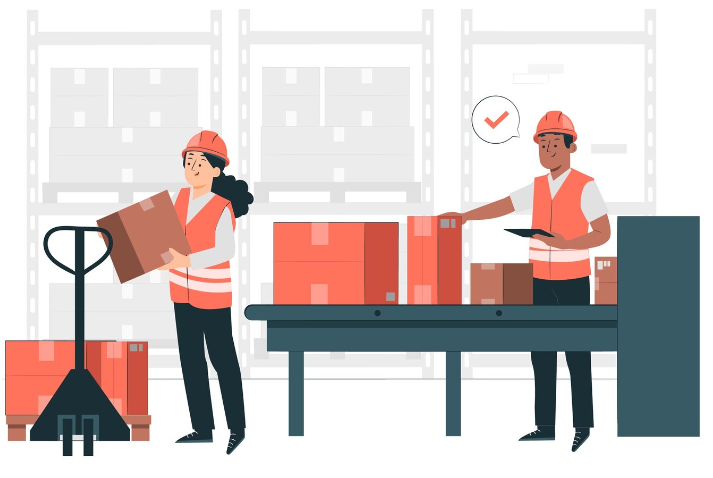Table of Contents
What Are the Potential Risks in Third-Party Logistics (3PL) Partnership
Time: Feb 05,2025 Author: SFC Source: www.sendfromchina.com
Outsourcing logistics to a third-party logistics (3PL) provider can revolutionize your supply chain efficiency and scalability. However, it’s not all smooth sailing—partnering with a 3PL provider comes with its fair share of risks. In this post, we’ll walk through some of the potential challenges businesses face when working with 3PLs and provide actionable tips for minimizing these risks.
1. Loss of Control Over Operations
One of the most significant concerns when outsourcing to a 3PL provider is the loss of direct control over logistics operations. While delegating logistics management can free up time and resources, it often means relying heavily on an external company to handle critical parts of your supply chain.Why Operation Control Matters
When issues arise, like delayed shipments or inventory errors, your business reputation is on the line—even though the 3PL is at fault. Losing the ability to directly oversee operations can also make it harder to ensure that the provider aligns with your company’s values and service standards.How to Mitigate It
- Choose a 3PL provider that emphasizes transparency and real-time tracking.- Set clear service-level agreements (SLAs) that define performance expectations.
- Regularly review and audit your 3PL’s performance.
2. Data Security and Privacy Risks

Potential Threats
- Hacking attempts on the 3PL’s systems.- Mismanagement of sensitive data.
- Non-compliance with data protection regulations like GDPR.
How to Protect Your Data
- Ensure the 3PL provider follows robust cybersecurity practices.- Ask about their data protection policies and encryption methods.
- Include clauses in your contract for liability in case of data breaches.
3. Service Disruptions and Delays

How It Impacts Your Business
- Late shipments can lead to dissatisfied customers and potential loss of business.- Delays in restocking inventory can slow down production or sales.
Risk Management Strategies
- Work with 3PLs that have contingency plans for emergencies.- Diversify your logistics network by using multiple providers instead of relying on one.
- Monitor supply chain risks and establish backup plans.
4. Dependency on the 3PL Provider

The Risks of Over-Dependency
- Lack of negotiation power.- Inability to switch to another provider quickly without disrupting your operations.
Tips to Stay Flexible
- Avoid long-term exclusive contracts unless absolutely necessary.- Maintain a relationship with secondary providers as a backup.
- Regularly assess whether the 3PL still meets your needs.
5. Hidden Costs
While outsourcing logistics can seem cost-effective at first, hidden fees can creep in, making the partnership more expensive than expected. These can include additional charges for warehousing, peak-season surcharges, or unexpected handling fees.How to Avoid Hidden Costs
- Thoroughly review contracts for any vague or unclear terms.- Ask for a transparent pricing structure from your 3PL provider.
- Compare multiple providers to find the best deal.
6. Compatibility and Communication Issues

What to Watch Out For
- Poor integration with your existing technology.- Ineffective communication channels.
- Misaligned priorities between your business and the 3PL.
Solutions
- Invest in 3PL providers that offer seamless integration with your software systems.- Schedule regular meetings to discuss performance and goals.
- Collaborate closely to ensure both parties understand each other’s expectations.
7. Quality Control Challenges
You’re entrusting your 3PL with maintaining a consistent level of service quality. However, if they fall short—whether in packaging, delivery, or customer service—your brand can suffer the consequences.Minimizing Quality Risks
- Conduct regular quality checks on your 3PL’s operations.- Provide clear guidelines and training for handling your products.
- Choose providers with a proven track record of high service standards.
8. Conclusion
While third-party logistics partnerships offer undeniable benefits like cost savings and improved efficiency, the risks involved shouldn’t be overlooked. By proactively addressing concerns such as loss of control, data security, and service quality, you can build a strong and successful partnership with your 3PL provider.9. FAQs
1. How can I ensure my 3PL provider is reliable?
Look for providers with strong reputations, verified customer reviews, and robust performance metrics. Additionally, conduct due diligence by asking for references and reviewing their history of service reliability.2. Are 3PL providers responsible for shipping delays?
While 3PL providers may be the cause of shipping delays, your business is ultimately accountable to your customers. Ensure that your contract includes penalties for failing to meet agreed-upon delivery timelines.3. What’s the biggest risk when partnering with a 3PL?
The biggest risk varies depending on your business, but common issues include loss of operational control, data security concerns, and potential service disruptions. Post Views:230
Post Views:230
Copyright statement: The copyright of this article belongs to the original author. Please indicate the source for reprinting.
Previous Post
What Is Supply Chain Analytics? Definition & How-to
Next Post
How to Make Shipping Policies for Your Dropshipping Business
TAGS
Hot Research
Recent News
- Third Party Logistics Definition, Process, and Advantages
- What Is Ecommerce Fulfillment? The Definition, Process, and Benefits
- Where Does Shein Ship From
- What Is Expedited Shipping? How It Works & Differences from Traditional Shipping
- Understanding Door-to-Door Shipping From China, the Definition, Benefits, Challenges, etc..
Get a Custom China Fulfillment Solution with FREE Storage for 30 Days
 Want to know about our services, fees or receive a custom quote?
Want to know about our services, fees or receive a custom quote?
 Please fill out the form on the right and we will get back to you within a business day.
Please fill out the form on the right and we will get back to you within a business day.
 The more information you provide, the better our initial response
will be.
The more information you provide, the better our initial response
will be.





 TAGS:
TAGS: